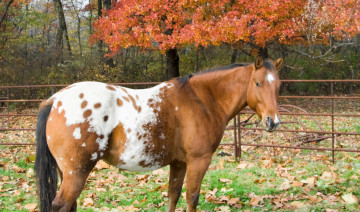As the vibrant colors of autumn emerge and temperatures start to drop, horse care routines need to adapt to the changing season. Fall brings unique challenges and opportunities for equestrians, requiring careful attention to your horse's well-being.
- Adjust Nutrition for Temperature and Activity Levels:
Fall often means cooler temperatures and reduced grazing opportunities. Adjust your horse's diet accordingly, considering the decrease in pasture quality. Provide high-quality forage, and if necessary, supplement with additional hay to meet their nutritional needs. Monitor your horse's weight and body condition, making adjustments as required. If your horse's activity levels decrease in the fall, ensure their diet aligns with their energy requirements.
- Maintain Hydration:
Even in cooler weather, horses need to stay adequately hydrated. Ensure a clean and easily accessible water source. In freezing climates, regularly check for ice formation in water buckets and troughs. Consider using heated water buckets to prevent freezing. Hydration is crucial for digestion, overall health, and helps horses cope with temperature variations.
- Manage Pasture and Grazing:
Fall is a time when pasture grasses might become less abundant and less nutritious. Rotate pastures if possible, allowing sections to recover and promoting healthier regrowth. Keep a close eye on your horse's weight, and if necessary, use grazing muzzles to control their intake. Additionally, be mindful of toxic plants that may still be present in the pasture.
- Prepare for Temperature Fluctuations:
Fall weather can be unpredictable, with warm days and chilly nights. Ensure your horse has access to shelter during colder nights and protection from the elements. Consider using blankets when necessary, especially for horses with short coats or those clipped for competition.
- Regular Hoof Care:
Fall can bring about changes in footing conditions. Regularly check your horse's hooves for signs of cracks, thrush, or other issues. Adjust the frequency of hoof trimming based on your horse's needs. Wet weather can contribute to softer hooves, so monitor for any signs of imbalances or lameness.
- Deworming and Parasite Control:
Fall is an excellent time to reassess your horse's deworming program. Consult with your veterinarian to create a targeted deworming plan based on fecal egg counts and your horse's specific needs. Proper parasite control is crucial for maintaining your horse's health.
- Fall Vaccinations:
Review your horse's vaccination schedule with your veterinarian. Fall is often a good time for boosters, especially if your horse is participating in events or if you live in an area where specific diseases are more prevalent during the fall season.
- Exercise and Mental Stimulation:
Maintain a consistent exercise routine to keep your horse fit and mentally stimulated. Fall is an excellent time for trail rides with the changing scenery. However, be cautious of slippery conditions and fallen leaves, which can hide uneven terrain.
As the leaves fall and temperatures fluctuate, proactive and thoughtful horse care becomes even more critical. By adjusting nutrition, monitoring hydration, managing pastures, preparing for temperature changes, and staying on top of healthcare needs, you can ensure your horse's well-being throughout the autumn months. A holistic approach to fall horse care sets the stage for a healthy, happy equine companion, ready to face the changing seasons with vigor.






Comments